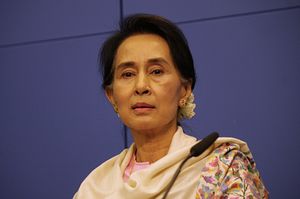By most accounts, the National League for Democracy (NLD), headed by international democracy icon Aung San Suu Kyi, is poised to sweep elections in Myanmar scheduled for late 2015, giving it control of parliament for the first time ever. The party is an electoral juggernaut, having won commanding victories in both of the elections it has contested since its founding in 1988. But the NLD’s wide popularity might ultimately fail to produce the kind of robust results garnered in previous campaigns, since the conditions in 2015 will include at least one key distinction: the presence of incumbent parliamentarians.
Myanmar’s first-past-the-post electoral system, in which candidates run for seats in single-member districts, gives incumbents an inherent advantage. They possess heightened name recognition and at least some familiarity with politics and campaigning. With close to 70 parties expected to contest elections in 2015 and no formal mechanism for narrowing the field, these assets will be crucial. Despite a recent change to the system for electing upper house members, the electoral landscape remains one in which candidates must rely on their own personal appeal in order to get elected.
In 1990, the NLD won more than 80 percent of the seats in a general election that was later nullified by the military. However, since that election took place in the aftermath of an unprecedented popular uprising against the military regime that had ruled the country for nearly three decades, it did not pit previously elected parliamentarians against new challengers. Similarly, when the party won 43 of 44 seats it contested in the 2012 by- elections, it triumphed in constituencies where incumbent parliamentarians had either died, resigned, or been appointed to other offices. In both cases, all seats up for grabs were wide open – no incumbents.
The power of incumbency remains untested in Myanmar elections. This year will be the first time in over five decades that sitting parliamentarians have run to hold their seats. The results could prove that incumbency is less influential in Myanmar than in other countries with mostly majoritarian electoral systems. But participants and observers would be wise not to underestimate the potential pitfalls this new variable poses for the NLD, which currently holds less than nine percent of national parliament seats up for election in 2015.
Other factors could also undermine the party’s chances. Current campaign restrictions will make it difficult for Aung San Suu Kyi to campaign around the country on behalf of her fellow NLD candidates. Since the party has done little to cultivate a strong second- and third-tier leadership, this restriction could be particularly problematic. In addition, much of the NLD’s messaging has been mixed and muddled as it seems unable to deliver a clear policy platform for voters to embrace. Aung San Suu Kyi’s awkward attempts to straddle domestic and international expectations, particularly surrounding the persecution of vulnerable Rohingya Muslims in western Myanmar, have further eroded confidence in her leadership.
Despite the NLD’s flaws, however, there is no reason to believe that its popularity has been irreparably eroded. Moreover, while public opinion is hard to gauge in Myanmar, there is no prevailing sense that President Thein Sein or his ruling Union Solidarity and Development Party (USDP) are really all that popular.
Still, the USDP has learned to play politics since it was swept into office in a deeply flawed 2010 election. The party has worked to cultivate a multiethnic membership, and USDP parliamentarians have used their positions to secure earmarks that benefit their constituents. But the USDP’s most important asset remains its incumbent status in parliament, which provides many of its members with an automatic leg-up over potential challengers, including those from the NLD.
It is far too early to predict the outcome of the 2015 election. Whether the contest will be allowed to proceed at all is still an open question. In September, Myanmar’s national election commission abruptly cancelled by-elections planned for the end of 2014, and recent comments by President Thein Sein have been interpreted by some political observers as opening the door to the possibility of postponing the 2015 contest. Whether or not the current regime will permit a truly free and fair general election is also unclear.
But if free and fair elections do take place, the seeming guarantee that Aung San Suu Kyi and the NLD will emerge as the undisputed victors must be reexamined. While the NLD remains in a strong position to greatly increase its presence in Myanmar’s national parliament, its leaders must act strategically to scale the structural impediments to victory.
Oren Samet is an independent journalist and researcher based in Bangkok, Thailand. He was previously a Junior Fellow at the Carnegie Endowment for International Peace in Washington, D.C.

































